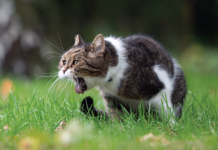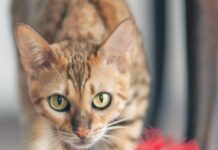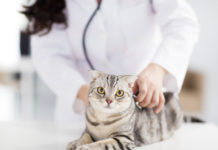Question: I have two 10-year-old offspring of a Siamese female and a male black tabby. The father had immune-mediated hemolytic anemia, and its cause remains unknown. The two offspring never have and never will go outside. I havent had them vaccinated since their father became ill in December of 2000. Since they are indoor-only cats (except for visits to the cat clinic for checkups, etc.), should I have them vaccinated? Im worried about some kind of immune illness being passed from the father of these cats, and Im afraid vaccinating them may make them more vulnerable to immune system problems.
Answer: Anemia is a condition in which there are too few red blood cells to carry the necessary amount of oxygen to the tissues. The number of red cells in the blood is roughly analogous to the amount of water in a bucket. But this bucket is leaky, so to keep the water level constant a running faucet continuously replaces the water being lost – the water flowing in replaces the water flowing out. The escaping water corresponds to the normal aging and death of red cells. The life span of feline red blood cells is only about 70 to 80 days, so theyre in constant need of replacement. These lost cells are replenished – like the water from the faucet – by factory tissues in the bone marrow.
Carrying our analogy further, anemia can come about in two ways: either the faucet is turned too low, or water is leaking out more quickly than it can be replenished. Nonregenerative anemia is due to inadequate production of red blood cells by the bone marrow – the faucets turned too low. There are many causes, but feline leukemia virus infection is the most common culprit. Regenerative anemia is caused by either blood loss from hemorrhage or premature death of red cells – the leak in the bucket is too big. It is absolutely essential to distinguish between these two forms of anemia if the condition is to be properly treated. Fortunately, simple blood tests and, if necessary, a bone marrow evaluation allow veterinarians to make the distinction.
Broken cells
Hemolytic anemia results from the abnormal destruction of red cells and is of the regenerative type.In immune-mediated hemolytic anemia (IMHA), a cats own immune system is fooled into thinking that the red blood cells are foreign – and thus destroys them. A plethora of conditions can trick the immune system into behaving badly: Infections, cancer, blood parasites, adverse reactions to medication, poisoning, and transfusion reactions are a few. But many cats with this form of anemia escape diagnosis in spite of extensive diagnostic tests. If a specific cause cant be identified and alleviated, management then relies on immune-suppressing medications, which dont always help, and many cats dont survive.
A family problem?
To my knowledge, cats are not genetically predisposed to IMHA. Granted, there are several rare feline hereditary diseases that cause hemolytic anemia, but the red cells break because theyre defective, not because there is an immune system malfunction. The bottom-line? I dont believe your cats are at greater risk of developing IMHA or any other immune system problems than are other cats.
What about vaccination?
There are no studies suggesting a relationship between vaccination and IMHA in cats. This being the case, I see no need to modify your cats vaccination protocol. Remember, the goal is to maximize the benefits of vaccination – of which there are many – while minimizing the risks. The majority of feline vaccines are rarely associated with serious adverse reactions. But as with any medical procedure, vaccination isnt entirely free of complications. To tip the balance toward the beneficial side, its important to vaccinate only against infectious agents to which your cats have a realistic risk of exposure, and then only as necessary.
Your veterinarian will be your best advisor, but for additional information, CatWatch readers are welcomed to ask for a copy of the brochure, Feline Vaccines: Benefits and Risks, by sending a self-addressed stamped envelope to: Cornell Feline Health Center, Cornell University College of Veterinay Medicine, Ithaca, New York 14853-6401.



